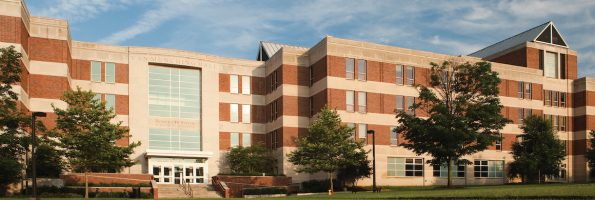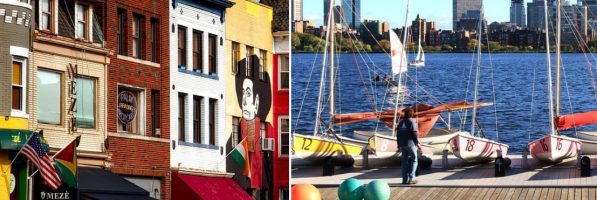5 Questions with the Senior Director of MBA Admissions at Maryland Smith

In our latest installment of the MetroMBA “5 Questions” series, we speak with Maria Pineda, the Senior Director of Admissions for the Full-Time MBA Program at the University of Maryland R.H. Smith School of Business. Pineda talks about the ideal MBA candidate, provides advice for getting accepted, and discusses unique opportunities at the school such as the Lead Fearlessly leadership development program.
1. What are you most excited about when it comes to the future of Maryland Smith?
“Smith is becoming a hub for designing the future. Business is becoming more competitive, more complex, more global, and more innovation-driven. Information, data, and technology are driving huge societal changes, often in ways that we can’t anticipate. We are preparing students to lead fearlessly, not just in today’s world, but in the world we can’t even imagine yet.
Smith MBAs learn how to turn data into insights, and insights into action. Our faculty bring their research into the classroom in ways that make even the most complex concepts relevant to managerial decision-making. The curriculum is designed to give students a strong foundation in analytical thinking and business fundamentals, and sharpen and hone leadership skills. With those skills, they’re ready to analyze problems, think creatively, innovate, and then lead a team to execute around a solution. As the economy keeps evolving, our students will be able to adapt.”
2. What does your ideal MBA candidate look like?
“First, we want self-starters, people who will take the initiative to pursue the many unique opportunities for learning and ‘transformation that come with a top MBA program. Our MBA students have a learning mindset. They are self-aware enough to “know what they don’t know’ and are adaptive, flexible and willing to work to grow their analytical skills and leadership competencies. We’re also looking for people who will actively contribute to our diverse, collaborative community, and seek out and consider viewpoints different from their own. We know that those traits—resourcefulness, a learning mindset, and an inclusive attitude—make fearless leaders.”

Maria Pineda, Senior Director of Admissions, Full-Time MBA Program
3. What is one thing a Maryland Smith MBA candidate can do for the best chance of getting accepted?
“Take control of your story. It all starts with self-reflection—know what your goals are and what you want to do with your MBA. Present yourself as if it was a job interview. Give us a good overview of your career accomplishments so far, and a thoughtful take on what you hope to accomplish in the future. Be authentic through the process, even as you’re bringing your best self to the table.
And get to know us! Connect with members of the admissions team and interact with current student ambassadors. That will help you see where your career goals align with our program’s distinctives.”
4. What parts of the MBA program should more students know about before starting their graduate school career?
“There are so many opportunities to develop your skills and leadership abilities beyond the classroom that you’ll need to curate your experiences. At Maryland Smith, those include opportunities like the Lead Fearlessly leadership development program, where students sharpen their leadership skills through out-of-the-box experiences like a yacht race on the Chesapeake Bay or small-group sessions with an executive coach. Or students can take on a challenge at the Datathon, part of the Smith Analytics Consortium’s annual conference, which brings together faculty and students with corporate partners. And there are case competitions, club leadership, consulting opportunities, and many more.”
5. Why do you love living and working in Maryland?
“Everyone knows about the many government agencies and NGOs headquartered in Washington DC, just seven miles from campus. But there are also many companies doing exciting work in biotech, defense, and cybersecurity. The job market is always fantastic (people say our local economy is recession-proof).
We have access to the culture, restaurants, and nightlife of a big city, with world-class attractions, a varied, high-quality performing arts scene and every pro sport you can name. We have beautiful outdoor spaces that are accessible from the hundreds of miles of biking and hiking trails around the region, whether you love the ocean or the mountains. And we have a really diverse mix of people that makes for a rich and interesting environment.”
3 Washington DC Nonprofit MBA Programs You Need To Know

It’s fair to say that the finance and consulting industries are the most popular for business school grads. But what about non-profits and social enterprises—where do they rank? While some assume that an MBA and working for a nonprofit do not go hand-in-hand, that’s not the case.
According to Fast Company, the nonprofit sector is the third-largest segment of the U.S. workforce, employing more than 13.7 million people at 1.8 million organizations, accounting for 10 percent of the country’s total workforce. The sector is the seventh-largest economy in the world—with combined assets of nearly $3 trillion, the U.S. nonprofit sector is larger than the economies of Brazil and Russia, and its neighbor to the north is taking notice. According to Nonprofit HR, in 2015, 50 percent of nonprofits were hiring compared to just 34 percent of for-profits. Nonprofit wages have also increased by 29 percent between 2000-10 and continue to rise, and exciting jobs in the sector are perfect for MBAs.
Some schools run entire centers and initiatives dedicated to the idea of social change. Other schools offer social entrepreneurship coursework, concentrations and graduate certificates with their MBA program. Here’s our rundown of three nonprofit MBAs in the Washington DC metro.
George Washington University School of Business
Students enrolled in the GWSB MBA program may combine their advanced business degree with a graduate-level certificate. One certificate program offered by the school is the Graduate Certificate in Nonprofit Management. This program is intended for students hoping to advance their careers in the nonprofit sector, as well as students who want to expand their knowledge but who do not want to commit to a master’s degree program.
The certificate requires that students complete 12 credit hours and maintain at least a 3.0 grade point average in order to be awarded the Graduate Certificate. Sample coursework includes:
- PPPA 6031 – Governing and Managing Nonprofit Organizations
- PPPA 6032 – Managing Fund Raising and Philanthropy
- PPPA 6016 – Public and Nonprofit Program Evaluation
- PPPA 6033 – Nonprofit Enterprise
- PPPA 6034 – Managing Nonprofit Boards
- PPPA 6053 – Financial Management for Public, Nonprofit, and Health Organizations
- PPPA 6058 – International Development NGO Management
The Graduate Certificate in Nonprofit Management program is available at the George Washington University’s main campus in downtown Washington DC.. Certificate students enroll in regular courses of the Trachtenberg School and earn graduate credit. Regular graduate tuition and fees apply.
Kogod School of Business – American University
The Kogod School of Business at American University also offers a Graduate Certificate in Nonprofit Management. According to the school, the certificate provides those currently working in the nonprofit sector a program combining both academic rigor and skill set training to enhance their performance in this growing work sector, as well as a foundation for master’s degree students about to enter the field.
The certificate program requires 18 credit hours of approved coursework with at least 9 credit hours at or above the 600-level and encompasses course offerings from the School of Public Affairs, the Kogod School of Business, and the School of Communication, as well as select coursework from the School of International Service and the College of Arts and Sciences.
Sample coursework includes:
- ACCT-607 – Financial Accounting
- FIN-630 – Financial Analysis of the Firm: Concepts and Applications
- COMM-642 – Strategic Communication Management
- MGMT-609 – Management of Organizations and Human Capital
- MGMT-633 – Leading People and Organizations
- PUAD-681 – Managing Nonprofit Organizations
University of Maryland R.H. Smith School of Business
The UMD Smith Dingman Center of Entrepreneurship and Center for Social Value Creation offer several different venues and opportunities for students to explore social entrepreneurship. According to the school, the Center for Social Value Creation was founded in 2009 and aims to educate, engage and empower Smith students to employ business principles that help not just the bottom line, but also the world. You can learn more about the UMD Smith Center for Social Value Creation here.
Students can pitch business ideas with a social mission through the Center’s Pitch Dingman program, or receive support and resources for their own social enterprises. The Center for Social Value Creation offers graduate coursework in social entrepreneurship at both the undergraduate and graduate levels, and leads Social Innovation Fellows, a one-year program that gives Smith School undergraduate students hands-on opportunities to seek innovative solutions for social and environmental challenges through the application of business principles.
To learn more about using your MBA for a nonprofit career, take a look at our “Should MBAs Work in the Nonprofit Sector” post. Check out our list of the top 10 nonprofit MBA programs in the country for even more options and information.
UMD Smith Faculty Honored for Contributions to Cybersecurity

Faculty at the University of Maryland R.H. Smith School of Business was recently recognized for their work in cybersecurity by the Institute of Electrical and Electronics Engineers (IEEE).
The Boston vs. Washington DC Full-Time MBA Battle

Choosing the right city for your MBA program can be a bigger choice than it seems: given the connections and opportunities an MBA typically provides, the city where you pursue your degree will likely be the same city where your career begins and grows.
Even if you’ve narrowed down your business school search to the east coast, you’ve still got a number of top metros to choose from. So regardless if you’re looking south to Washington, D.C., or north to Boston, both metros will likely offer a number of benefits for up-and-coming business professionals.
Both D.C. and Boston offer a number of exceptional full-time MBA programs, giving a prospective MBA a lot to think about. Below, we’ll break down some of the biggest differences in location, programs, and job placement for each metro.
Location
As long as you can deal with snow, Boston is a multicultural hub of business that covers a variety of industries, from startups to high tech and the creative economy. Massachusetts is home to 30 Fortune 500 companies, with massive corporations like General Electric and Liberty Insurance Group centered within Boston. However, as the city continues to grow and improve, the cost of living is also climbing, with Boston ranking eight overall as the most expensive city in the United States.
If you are looking to use your business acumen in a government setting, there are few places better to go than the nation’s capital. With fifteen companies making the Fortune 500 list in the Washington DC metro area, there are a number of opportunities for MBAs to put their business skill to work, even outside of government agencies, with companies like Wal-Mart and Exxon Mobile leading the list. However, DC even outranks Boston for cost of living, ranking as the third most expensive city in the United States.
Washington Full-Time MBA Programs
The Washington DC metro has more than 35 higher education institutions with post-bachelor programs for business students. Featuring some of the top ranked MBA programs in the country, many of the DC programs focus on professional integrity and ethics, attempting to reflect its location in the country’s capital. Many of the MBA programs here also focus on placing business within a global context, encouraging students to gain real-world experience outside of the classroom to gain a better understanding of the global business community.
Full-Time MBA Programs in DC Include:
- George Mason University School of Business
- George Washington University School of Business
- Kogod School of Business – American University
- University of Maryland R.H. Smith School of Business
Boston Full-Time MBA Programs
The Boston metro features some of the top ranked and oldest business schools in the world, which focus on placing students within the global economy and encouraging study abroad opportunities that allow students to get hands-on experience in international business. Given Boston’s reputation as a growing business hub, many of the top jobs in the city may require an MBA.
Full-Time MBA Programs in Boston include:
- Sloan School of Management – MIT
- Harvard Business School
- Questrom School of Business – Boston University
- Sawyer Business School – Suffolk University
- Carroll School of Management – Boston College
Cost of MBA Programs
Cost can be an important consideration when choosing a degree program. The average tuition costs of the Washington DC programs mentioned above is roughly $82,090, though the number may be slightly less for local students. In Boston, the range may be slightly higher. Harvard Business School can cost up to $122,000 per year, but other quality programs in the Boston metro can also be found as low as $91,040.
Job Placement and Salary
The cost one is willing to spend on an MBA is often largely determined by the potential salary that can be made after obtaining the degree. Given that both Boston and DC are among the U.S. cities with the highest cost of living, salary may be an important determination in selecting a city to start your career. Thankfully, both cities offer the chance for high earning potential. According to PayScale, Boston MBA graduates can earn anywhere from $53,725 on average to $173,940. In Washington DC, where there is a slightly higher cost of living, salaries can range from $58,402 to $147,715.
University of Maryland Smith School Program Inspiring Young Entrepreneurs

This summer, the University of Maryland R.H. Smith School of Business has served as host for middle school students in the Ashoka Youth Venture Program, helping students to think like an innovator as they venture out to change the world.
